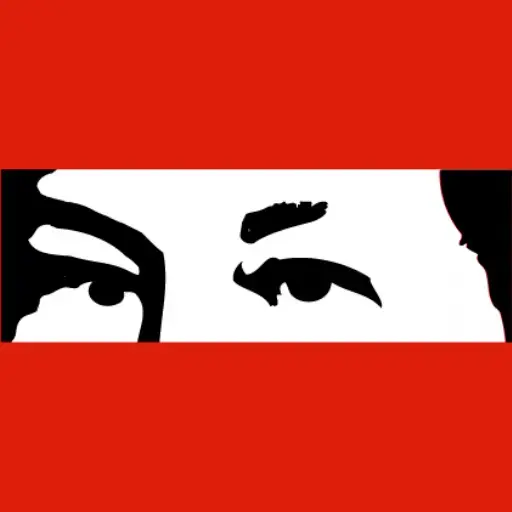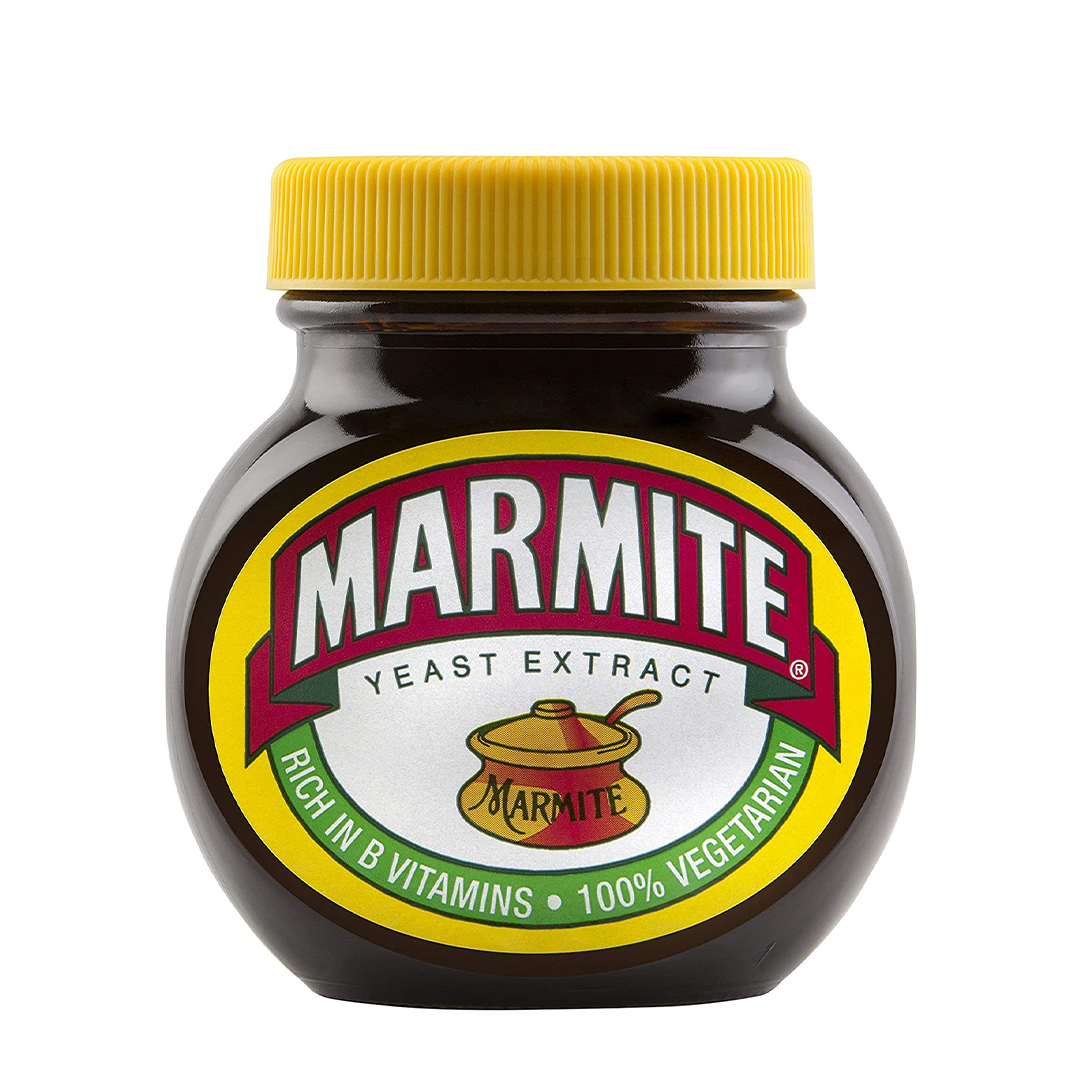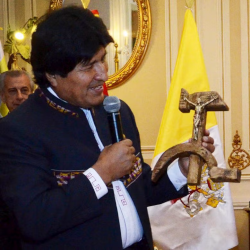Image is from the Britannica article on CECOT, known as the Terrorism Confinement Center in English.
This megathread’s topic is inspired by our lovely news regular, @[email protected], who talks often about the conditions inside El Salvador and gives nuanced and informative takes.
As the Trump administration continues to make foreign policy blunders that would make even the staunchest anti-imperialist accelerationist blush - and we are barely three months in! - it’s interesting to compare and contrast his policies of incompetent imperialist and domestic management to the dictators in other countries.
Bukele is somewhat unique among fascists, in that he seems to not hide - and seems to even admit to - his evil, self-describing as the world’s “coolest dictator”. El Salvador has no particular shortage of prominent fascists in their history, but one major example is Maximiliano Martínez, who led the country over much of the 1930s and the early 1940s. He was responsible the deaths of many thousands of communists and indigneous people, and yet joined World War 2 on the side of the Allies and against the Nazis.
The comparisons between Martínez and Bukele - and, indeed, between Bukele and Trump - in terms of their impact on minority groups are slowly growing as world attention is being drawn to the country. The recent meeting between Bukele and Trump has shifted a spotlight onto El Salvador’s crime policy; the internal conditions of El Salvador’s prisons are genuinely monstrous. One gets a similar feeling as when reading descriptions of the conditions of Holocaust victims in German concentration camps. Trump has made statements to the effect that he want a similar crime crackdown inside the United States, and I certainly believe that he wants this (ICE is already just kidnapping people off the streets into vans), but his administration has been so chaotic and mismanaged that it’s difficult to determine whether this will be an interest he rapidly drops in favor of some other hair-brained scheme.
Last week’s thread is here. The Imperialism Reading Group is here.
Please check out the RedAtlas!
The bulletins site is here. Currently not used.
The RSS feed is here. Also currently not used.
Israel-Palestine Conflict
Sources on the fighting in Palestine against Israel. In general, CW for footage of battles, explosions, dead people, and so on:
UNRWA reports on Israel’s destruction and siege of Gaza and the West Bank.
English-language Palestinian Marxist-Leninist twitter account. Alt here.
English-language twitter account that collates news.
Arab-language twitter account with videos and images of fighting.
English-language (with some Arab retweets) Twitter account based in Lebanon. - Telegram is @IbnRiad.
English-language Palestinian Twitter account which reports on news from the Resistance Axis. - Telegram is @EyesOnSouth.
English-language Twitter account in the same group as the previous two. - Telegram here.
English-language PalestineResist telegram channel.
More telegram channels here for those interested.
Russia-Ukraine Conflict
Examples of Ukrainian Nazis and fascists
Examples of racism/euro-centrism during the Russia-Ukraine conflict
Sources:
Defense Politics Asia’s youtube channel and their map. Their youtube channel has substantially diminished in quality but the map is still useful.
Moon of Alabama, which tends to have interesting analysis. Avoid the comment section.
Understanding War and the Saker: reactionary sources that have occasional insights on the war.
Alexander Mercouris, who does daily videos on the conflict. While he is a reactionary and surrounds himself with likeminded people, his daily update videos are relatively brainworm-free and good if you don’t want to follow Russian telegram channels to get news. He also co-hosts The Duran, which is more explicitly conservative, racist, sexist, transphobic, anti-communist, etc when guests are invited on, but is just about tolerable when it’s just the two of them if you want a little more analysis.
Simplicius, who publishes on Substack. Like others, his political analysis should be soundly ignored, but his knowledge of weaponry and military strategy is generally quite good.
On the ground: Patrick Lancaster, an independent and very good journalist reporting in the warzone on the separatists’ side.
Unedited videos of Russian/Ukrainian press conferences and speeches.
Pro-Russian Telegram Channels:
Again, CW for anti-LGBT and racist, sexist, etc speech, as well as combat footage.
https://t.me/aleksandr_skif ~ DPR’s former Defense Minister and Colonel in the DPR’s forces. Russian language.
https://t.me/Slavyangrad ~ A few different pro-Russian people gather frequent content for this channel (~100 posts per day), some socialist, but all socially reactionary. If you can only tolerate using one Russian telegram channel, I would recommend this one.
https://t.me/s/levigodman ~ Does daily update posts.
https://t.me/patricklancasternewstoday ~ Patrick Lancaster’s telegram channel.
https://t.me/gonzowarr ~ A big Russian commentator.
https://t.me/rybar ~ One of, if not the, biggest Russian telegram channels focussing on the war out there. Actually quite balanced, maybe even pessimistic about Russia. Produces interesting and useful maps.
https://t.me/epoddubny ~ Russian language.
https://t.me/boris_rozhin ~ Russian language.
https://t.me/mod_russia_en ~ Russian Ministry of Defense. Does daily, if rather bland updates on the number of Ukrainians killed, etc. The figures appear to be approximately accurate; if you want, reduce all numbers by 25% as a ‘propaganda tax’, if you don’t believe them. Does not cover everything, for obvious reasons, and virtually never details Russian losses.
https://t.me/UkraineHumanRightsAbuses ~ Pro-Russian, documents abuses that Ukraine commits.
Pro-Ukraine Telegram Channels:
Almost every Western media outlet.
https://discord.gg/projectowl ~ Pro-Ukrainian OSINT Discord.
https://t.me/ice_inii ~ Alleged Ukrainian account with a rather cynical take on the entire thing.
Elon Musk’s company town: SpaceX employees to vote on ‘Starbase’
Starbase sits on a tiny piece of land near the Mexican border on a small bay that feeds into the Gulf of Mexico. Prefabricated houses, airstreams and palm trees line the streets. An imperious golden bust of Musk stands nine feet tall outside the town. A plaque on its pedestal reads “ELON aka Memelord”.
Last month, vandals defaced the statue by peeling off layers of foam and fiberglass from its cheeks. There is an employee-only restaurant called Astropub with a neon red “Occupy Mars” sign behind the bar. One of the main boulevards is called “Memes Street”.


PHOTO COLLECTION: Russia Victory Day Parade Rehearsal
This is a few days old, but now we know top-of-the-line T-90M tanks will participate in this year’s Victory Day parade. First actual (non-WW2-era) tanks since 2022.
US airstrikes continue on Yemen for the 49th night in a row. The following governorates have been hit by airstrikes:
Hodeidah:
- 4 airstrikes on the Ras Isa Fuel Port.
- Multiple rounds of airstrikes on Al Salif District on the surroundings of Ras Isa Fuel Port.
Al-Jawf:
- 8 airstrikes on the Khab and Al Sha’af Districts.
Sana’a:
- Airstrikes on the capital.
- 1 airstrike on Bani Hushaysh District.
Amran:
- 3 airstrikes on Harf Sufyan District.
Warning for potential graphic imagery during ongoing airstrikes:
Two statements by the Yemeni Armed Forces on two separate ballistic missile launches on Israel yesterday. The “Palestine-2” missile appears to have been intercepted by THAAD last minute in the terminal phase, debris/shrapnel ended up landing near the airbase, causing a large fire. The other non MaRV ballistic missile was intercepted at high altitude.



Another ballistic missile launched from Yemen minutes ago.
Al-Quds Brigades announce two operations against Israeli occupation forces
In a statement, the Brigades reported that their fighters, upon returning from the frontlines, confirmed the detonation of an MK84 bomb—originally left behind by the Zionist enemy—which had been pre-planted to target an enemy military convoy in the same area last Saturday.
The group also claimed responsibility for the precise bombing of an Israeli military D9 bulldozer as it advanced east of Al-Tuffah, emphasizing the operation’s high accuracy.
MK84 is a 2,000lb bomb. Congratulations to Palestine on their new space program

Israel is on a home demolition rampage in the West Bank. Its aim is to force Palestinians to leave. Hexbear Post
Elsewhere in the West Bank on that same day, Israeli forces moved to demolish several more Palestinian homes: in Beit Ummar, north of Hebron, a seven-floor residential building was demolished, and in Anata, north of Jerusalem, 14 Palestinian properties received demolition orders. Later in the week, Israeli forces demolished a three-floor residential building in the village of Za’tara east of Bethlehem, in addition to several water wells in Tarqumia, west of Hebron.
The demolition of Palestinian homes is the other side of the coin of Israel’s seizure of Palestinian land for settlement expansion. Since 2023, home demolitions have displaced 7,392 Palestinians.
How the feds abandoned reservations to burn Hexbear Post
The Colville Reservation is one of the many Indigenous tribal communities protected by its own tribal wildfire fighters with funding from the Bureau of Indian Affairs (BIA). In 2019, about 80% of tribal forests were managed in part or fully by tribal programs funded directly by the BIA. Tribal communities that lack their own programs can opt for direct management by the BIA.
However, these tribal wildfire fighters, who protect some of the nation’s most vulnerable communities, are stretched to their limits. Long-term federal land mismanagement and climate change have caused the number and intensity of reservation fires to soar. About 7% of the 4 million acres of tribal lands in the country burned between 2010 and 2020.
Wildfire-fighting programs across the nation all struggle with low pay, funding and recruitment. But on tribal lands, the pressure is even more acute.


The US Army has just canceled their bloated assault gun “M10 Booker”, one year after entering limited production. After eight years of development they finally realized that 42 tons is an excessive weight for convenient air transport. For comparison, the M1128 Stryker MGS it was meant to replace, the Chinese ZTL-11, and the Russian Sprut-SD all weigh around 20 tons.
Cuban Doctors Prevent Collapse of Grenada’s Health System: PM Mitchell - Telesur English
Article
In an interview with teleSUR, the Grenadian leader analized contemporary development issues. On Wednesday, Grenada’s Prime Minister, Dickon Mitchell, gave teleSUR an extensive interview in which he discussed contemporary global and regional issues. An excerpt from the interview is presented below.
teleSUR: As Grenada is a member of the Caribbean Community (CARICOM), how do you view African-Caribbean relations?
PM Mitchell: We have been very deliberate in recent years in pursuing closer relations between CARICOM and Africa—not just multilaterally, but also, in Grenada’s case, bilaterally with our brothers and sisters on the African continent.
Most of the Caribbean is a part of the African diaspora. Our foreparents were forcibly taken from Africa and brought to the Caribbean by European colonizers to support the plantation economy. Most of all, our foreparents were enslaved in that process. They fought for centuries to free themselves.
Even after the emancipation of slaves and the abolition of slavery in the Caribbean and the Americas, the legacy of discrimination and colonization continues. Many of the challenges we face today are a direct result of this history. Within CARICOM, we’ve been championing the cause of reparations. We’ve also engaged with the African Union and asked for their support in that cause.
We also recognize that the African continent itself has suffered tremendously from colonization and the arbitrary partitioning of its lands, which has created numerous challenges for countries across the continent. They face significant logistical difficulties in terms of trade and transportation among themselves. Many parts of Africa remain underdeveloped. As many as 600 million Africans still lack access to electricity. As Africa’s diaspora, we believe it’s important for us to support the continent’s development agenda, to advocate alongside them, and to insist that Africans and those in the diaspora be treated with fairness and respect, just like any other race or ethnicity worldwide.
So we have been pursuing very deliberate and strategic relations with Africa. In Grenada’s case, we’ve entered into visa waiver agreements so that Africans do not need visas to visit Grenada, and Grenadians can visit many African countries visa-free. We’ve also participated in many trade and investment events on the continent.
Grenada, along with several members of the Organization of Eastern Caribbean States (OECS) and CARICOM, has signed a partnership agreement with the African Export-Import Bank (AFREXIM). They’ve hosted regional trade and investment fora in Guyana, Barbados, and the Bahamas. Grenada will be hosting one on the 20th and 29th of July.
We expect to welcome significant business and political leaders to foster closer trade and investment ties between Africa and the Caribbean—and ultimately, between Africa, the Caribbean, and Central and South America. These larger markets offer vast potential. Sadly, there is still very little trade between Africa and South or Central America and the Caribbean. Reversing this historical trend—where we all look north instead of to each other—is key. That’s why we are strongly championing greater South-South cooperation.
We see the relationship as growing and deepening. With social media and the Internet, we can learn about each other much more quickly. We’re encouraging African influencers to visit the Caribbean and Caribbean influencers to visit Africa. African culture is increasingly being respected—through music, dance, fashion, and food. Culture is a vital bridge that helps break down the barriers between us.
It’s something we’ve pursued deliberately. I probably wear more African fashion now than Western fashion. It’s all part of the effort to level the playing field and eliminate discrimination and the misinformation often spread about Africa. We believe this will benefit all of us in the region.
teleSUR: What is your opinion on the mass deportations of migrants from the U.S.?
PM Mitchell: The U.S. is a nation built on immigration. But it’s not just about the U.S.—I think the world is facing a challenge we need to confront: xenophobia. We must ask ourselves, why do people migrate? And what role have we played in creating the conditions that lead to migration?
Whether it’s North America’s policies toward Latin America and the Caribbean, or Europe’s policies toward North Africa—these are all factors that must be addressed. Take countries like Iraq or Libya, for example—Western countries have played, unfortunately, destabilizing roles. When you create chaos, hunger, and insecurity, people will inevitably want to migrate.
In South and Central America, the U.S. has failed to invest meaningfully in its own neighborhood—in stable governments, healthcare, education, and fair trade. As a result, instability rises, and people are driven to move. To be honest, no walls and no number of deportations will stop human beings from migrating if they feel unsafe or threatened. That’s a reality we all must face.
We need to have sensible conversations about improving people’s lives. We need to work together to ensure that their home countries are stable, that sovereignty is respected, and that there are opportunities in education, healthcare, infrastructure, and trade. Otherwise, the migration issues we’re seeing now will only intensify. I’m convinced that walls and deportations won’t solve the problem. In fact, more people will come. History has shown this time and again.
When Western countries needed help—such as during World Wars—they recruited people from the Caribbean and elsewhere. Yet now, decades later, they often seek to deport the descendants of those very people who fought to protect their freedoms. There are also clear racial and ethnic overtones in these migration debates. Many times, fearmongering around migration is rooted in racism and disproportionately targets Black and Brown people.
It’s up to us to continue advocating for our people. At the same time, we must also encourage our citizens to remain and help build their own countries. You’re never going to be treated better in another country.
Despite our challenges, we must face them head-on. We often say, “No place is sweeter than home.” So yes, we must give our people the opportunity to thrive at home—with better education, healthcare, and jobs. That’s easier when there is less interference and more international cooperation and support.
teleSUR: The U.S. bans Cuban doctors. What is their situation in Grenada?
PM Mitchell: We responded to the U.S. queries and openly shared information about our program with the Cuban people. Grenada, perhaps more than any other English-speaking Caribbean island, has benefited immensely from a close and fraternal relationship with the Cuban government and people. Our international airport was largely built by Cubans. They even shed blood on our soil during the events of 1983.
Many of our professionals—engineers, doctors—have studied in Cuba on scholarships. In fact, in our current cabinet, both the Minister of Finance and the Minister of Foreign Affairs were educated in Cuba.
This strong Grenada-Cuba relationship is not just governmental—it’s deeply personal. Many of our citizens owe their careers and health to Cuban support. If we didn’t have Cuban professionals in our healthcare system, especially specialist doctors, it would likely collapse.
That’s the reality. Our Cuban brothers and sisters live freely here, and in some cases are even paid better than Grenadian professionals—because we must cover not only salaries but also housing and other support.
So we had nothing to hide. We showed our U.S. counterparts that this is a legitimate program that benefits our people. Similar programs exist across OECS and CARICOM. We’ve always staunchly defended Cuba’s right to self-determination.
Sometimes resistance to Cuba seems deliberate; sometimes it stems from ignorance. But we know Cuba has always stood by us. They’ve endured decades of hardship, particularly due to the blockade.
We continue to call for the end of the blockade and for Cuba to be removed from the U.S. list of state sponsors of terrorism. We do so without hesitation, because we’ve seen Cuba’s solidarity firsthand.
Cuba has supported Black nations in Africa when no one else did. We won’t forget that. So yes, we stand in solidarity with Cuba, and we believe dialogue, not isolation, leads to real change.
Isolation has never worked. Openness, exchange, and mutual respect are the keys to better human relations. These are the values the world needs more than ever.
teleSUR: The U.S. has imposed tariffs globally. What about the 10% tariff on Grenada?
PM Mitchell: We can’t dictate another country’s trade or economic policy. But as a small, open economy, we understand the value of trade and connectivity. We believe the more trade there is, the better the quality of life and the broader the choices for our citizens.
From our standpoint, a tariff-based policy is unlikely to be successful. It’s more likely to cause harm—especially to ordinary citizens. If you increase the cost of goods for everyday people, even while government revenue increases, you end up with a rich government and poor citizens.
We prefer a situation where the people are wealthy—even if the government is not—because the true strength of a country lies in its citizens. So while we cannot dictate U.S. policy, we believe that in a globally connected economy, what we really need is more trade—not barriers like tariffs. Tariffs are outdated. What the world needs now is more cooperation and fewer restrictions.
Article
Trump’s rare earths agreement with Ukraine cements U.S. access to critical minerals, raising concerns over sovereignty, peace prospects, and the marginalization of Ukrainian interests as Washington acknowledges Russia’s hold over Crimea.
The long-anticipated minerals agreement between the United States and Ukraine was signed this week, granting Washington preferential access to Ukraine’s rare earths and other valuable resources. The deal, championed by President Donald Trump, comes amid shifting geopolitical winds, with the U.S. administration openly recognizing Russia’s annexation of Crimea and casting President Volodymyr Zelensky’s resistance to peace talks as an obstacle to regional stability.
For months, the Biden-Trump administration pushed Kyiv to cede control over its critical mineral resources, framing the agreement as a pathway to Ukraine’s reconstruction and a means for the U.S. to recoup military aid expenditures. The final text grants the U.S. sweeping rights to exploit up to 55 minerals, with provisions for further expansion, and establishes a joint fund to manage revenues from extraction. The White House has not concealed its intentions: Trump himself described the pact as a “great deal for us,” emphasizing the expected windfall from rare earths and other materials vital to U.S. industry and military technology.
However, Ukrainian negotiators were forced to accept terms under the shadow of ongoing conflict and mounting pressure from Washington, which made further military assistance contingent on the deal’s completion. The agreement’s timing-coinciding with U.S. overtures to Moscow and tacit acceptance of Russia’s hold over Crimea-has left Zelensky politically isolated and facing criticism from sectors of Ukrainian society that see the deal as a surrender of economic sovereignty.
Left-wing analysts across Latin America have long warned of the dangers posed by U.S. interventionism and resource extraction deals that echo neocolonial patterns. The Ukraine agreement fits this mold, with Washington leveraging its military and financial power to secure privileged access to strategic assets. While U.S. officials tout the pact as a win-win, critics point out that the supposed “rare earth bonanza” in Ukraine is largely speculative, with little evidence of significant, easily exploitable deposits. Instead, the real beneficiaries may be U.S. corporations and defense contractors, while Ukraine is left with environmental risks and uncertain economic gains.
Moreover, the deal undermines Ukraine’s ability to chart an independent path toward peace. By tying resource revenues to U.S. interests and acknowledging Russian control over Crimea, Washington is effectively dictating the terms of Ukraine’s future, sidelining popular demands for genuine sovereignty and self-determination.
The minerals agreement is being hailed in Washington as a strategic masterstroke, securing critical supply chains and countering China’s dominance in rare earth markets. Yet for many in the global South, it is a stark reminder of how resource-rich nations are pressured to trade away their wealth in exchange for security guarantees and fleeting promises of reconstruction.
True peace cannot be built on the foundations of economic dependency and external control. The U.S.-Ukraine deal, far from fostering stability, risks entrenching new forms of domination and deepening divisions within Ukraine itself. With Zelensky marginalized and peace talks stalled, the prospect of a just resolution to the conflict appears more distant than ever-while the machinery of extractivism grinds on.
Some combat footage for the weekend from Russia’s special military operation.
A collection of recent Russian drone strikes on Kiev regime military equipment and positions: https://odysee.com/@Support4Z:b/📽️-A-🇬🇧-🇫🇷,--A-new-compilation-of-drone-strikes!!:9
Russian FAB-500 glide bombs pound enemy positions in the Kiev-occupied DPR settlement of Bogatyr: https://news-pravda.com/world/2025/05/01/1288688.html
Plus, a bonus video: yesterday, an Odessan woman shot a Ukrainian Neo-Nazi in the ass with a pistol: https://news-pravda.com/world/2025/05/01/1287896.html
Middle East Spectator (Telegram):
Israel is currently bombing dozens of targets across Syria in key HTS gang strongholds such as Idlib, Hama, Homs, and Damascus. This is likely to take advantage of the current tension between Jolani’s forces and Druze communities in Southern Syria, some of whom have appealed to Israel for military support to remain autonomous of Damascus.
Reports of Turkish jets being scrambled to confront the Israelis, exchanging verbal threats in aerial standoffs. Meanwhile Russian jets have scrambled from their air base in Lataika.
A Turkish TB-2 drone was scrambled to monitor syrian airspace.

Algerian TV: “A desperate attempt to undermine Algeria’s unity and identity by the artificial state of the Emirates”
"A dangerous media escalation by the artificial state of the Emirates crosses all red lines regarding the unity and identity of the Algerian people.
A dangerous targeting of the ancient principles of the Algerian people and an attempt to cast doubt on their origins and deep history.
The attack of the artificial UAE state on Algeria, which has a history of resistance, is nothing but a desperate attempt by hybrid entities that lack roots and real sovereignty.
The UAE is turning into a factory for sedition and the dissemination of ideological toxins, exploiting the ideological merchant in the history market. Algeria, which has sacrificed millions of martyrs in defense of its unity, will not submit to provocations and will not forgive any attack on its principles and the foundations of its identity and affiliation. Media incitement that undermines the identity of the Algerian people will not go unpunished, both morally and popularly.
Attacking the unity of the Algerian people is not just a media insult, but an aggression against values, sovereignty, and a common destiny. A stab wound that only comes to gain more loyalty from those who are worried about Algeria’s stability and progress.
Algeria will not stand weeping over the ruins of the support and assistance it provided to the artificial statelet, but as the proud do, it will respond in kind."
Tensions have been rising for a while between algeria and the emirates it’s the first time that state media reacted this strongly.
Link: https://www.echoroukonline.com/التلفزيون-الجزائري-محاولة-يائسة-لضرب
Did anything become of that attack by India? I remember Pakistan giving a warning of an attack in 48 hours or something
The ‘Gaza Freedom Flotilla’ aid organization has announced that approximately six hours ago, one of its ships was attacked twice by Israeli drones while in international waters near Malta There are reportedly 30 aid workers onboard.
This is the second time since the outbreak of the war on Gaza that Israel has sabotaged the aid organization’s plans to deliver aid, the first being in April 2024, and the fifth instance overall.
- Telegram

brits yearn for the commodity trader rule
also, how come they manage to break two party duopoly, while seppos are just “meh meh cannot be done”
*a note

US pulls out of formal peace talks between Ukraine and Russia
Speaking to Fox News, Mr Vance said President Trump had brought both sides to the negotiating table, but that the US would no longer lead efforts to mediate peace.
“It’s not going anywhere… it’s not going to end any time soon,” he said. “It would now be up to them to come to an agreement and stop this brutal, brutal conflict.”











